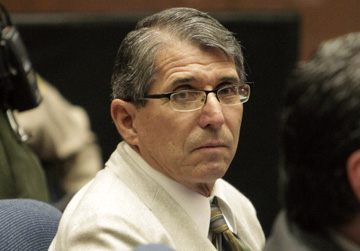The involuntary manslaughter trial went into extra innings Monday, with anesthesiology expert Dr. Paul White still on the stand at the end of the day, despite hopes that Murray's defense would rest today.

While the trial might be dragging on, however, the energy level remained high, with prosecuting attorney David Walgren hammering away at White in an effort to discredit his previous testimony for Murray's defense.
In chipping away at White's testimony, Walgren used one of the most powerful tools at his disposal — White's own words, in the form of articles he'd written about the outpatient use of anesthetics. Walgren rattled off passage after passage written by White about the circumstances and requirements in providing anesthesia to a patient outside of a hospital setting — and Murray's care for Michael Jackson, as depicted in previous testimony and evidence, bore little resemblance to White's description of how anesthesia should be administered safely.
Read on for a full run-down of today's court proceedings, and check back for our in-depth report tomorrow, as Murray's trial begins to wind to a close. Previously…
Update, 12:05 p.m. PT
Prosecution attorney David Walgren aggressively questioned anesthesiology expert Dr. Paul White, the final witness for the defense in the involuntary manslaughter trial of Conrad Murray on Monday, challenging White's theory on how Michael Jackson received his fatal dose of the anesthetic propofol, as well as using White's own words to paint Murray's care of Jackson grossly inadequate.

Under Walgren's questioning, White — who maintains that Jackson most likely self-injected the dose of propofol that killed him — admitted that Murray probably left Jackson unattended for a 35 to 40 minute period, during which the singer presumably gave himself the fatal dose of propofol. During an interview with police conducted two days after Jackson's death, Murray maintained that he had only left Jackson alone for two minutes, to take a bathroom break.
White also admitted that Jackson likely performed the injection with a syringe that Murray had prepared, then left within Jackson's reach — which didn't exactly speak well of Murray's care and diligence.
Perhaps most damningly, Walgren presented passages on the use of anesthesia in an out-patient setting authored by White himself, which detailed the necessary components when administering anesthesia in a non-hospital setting. Many of the essential components — such as the "continuous presence of a member of the anesthesia care team" and a written plan for emergency transport — weren't present during Murray's treatment of Jackson.
One of White's articles stated that "vigilant monitoring is required" when administering anesthesia, as the patient could quickly slip from mild to deep sedation, "and thus may be at risk for airway obstruction, oxygen desaturation and even aspiration."
Under repeated grilling from Walgren, White reluctantly opined that the standard of care laid out in his guidelines should at least be matched when administering propofol in a patient's bedroom.
White went so far as to admit, "I would not administer propofol in a bedroom."
Asked whether he would have done as Murray had and allow himself to be hired by Jackson to give him nightly doses of propofol for his insomnia, White replied, "Absolutely not. That would be a job that I would never consider accepting."
On re-direct, Murray's attorney, J. Michael Flanagan, attempted to take heat off of Murray for allegedly stalling on calling 911 when he found Jackson not breathing.
Flanagan asked White if — with the body on the second floor of a home that's fortified by a perimeter fence guarded by security, and a lack of landlines available to call out in the home — it made sense for Murray to tell Jackson's kitchen summon security, as Murray did on the day of Jackson's death.
White said that, yes, it was a reasonable approach, but it would have made the most sense to attempt resuscitation first.
Previously…
In what could be the most dramatic day of the Conrad Murray involuntary manslaughter trial, prosecutor David Walgren will cross-examine Dr. Paul White, the defense team anesthesiologist expert — and final witness — who testified that he believes Michael Jackson gave himself his fatal dose of drugs.
 The Los Angeles County coroner ruled Michael Jackson died of "acute propofol intoxication," and that sedatives were also a factor. Prosecutors contend Murray is criminally liable for Jackson's June 25, 2009 death because he recklessly administered the propofol, a potent surgical anesthetic drug, and was negligent in properly monitoring Jackson.
The Los Angeles County coroner ruled Michael Jackson died of "acute propofol intoxication," and that sedatives were also a factor. Prosecutors contend Murray is criminally liable for Jackson's June 25, 2009 death because he recklessly administered the propofol, a potent surgical anesthetic drug, and was negligent in properly monitoring Jackson.
Read more: Michael Jackson Likely Gave Himself Fatal Propofol Dose, Expert Says
Supporting the defense, White testified on Friday that the amount of drugs found in Jackson's system led him to believe that Jackson died after injecting himself with propofol and swallowing a large dose of lorazepam without Murray's knowledge.
White's conclusion is in direct opposition to that of prosecution propofol expert Dr. Steve Shafer — a White colleague and former student — who testified earlier in the trial that he believes the "only scenario" that explains Jackson's death is that Murray put the singer on a constant IV drip of propofol in the hours before his death.
White called the prosecution's theory "befuddling."
Read more: Michael Jackson's Fatal Bid for Normal Life Emerges at Trial
CNN.com reports that closing arguments could happen as soon as Tuesday, and that the trial that began on Sept. 27 should be in the hands of the jury by the middle of this week.
Murray faces up to four years in prison and loss of his medical license if convicted, though a new California law could mean his sentence would be reduced to two years and be served in a county jail.
Watch our live trial feed:




